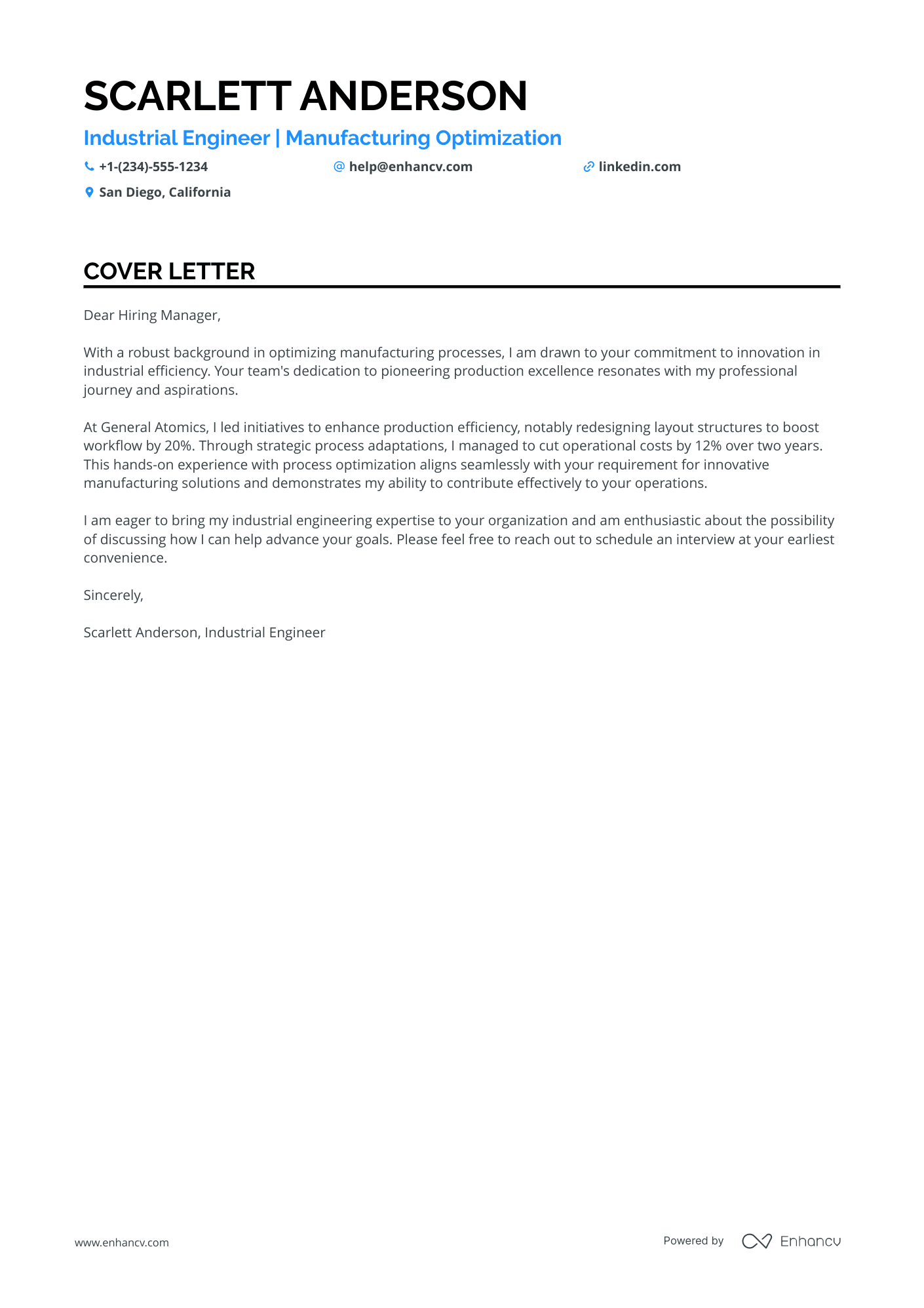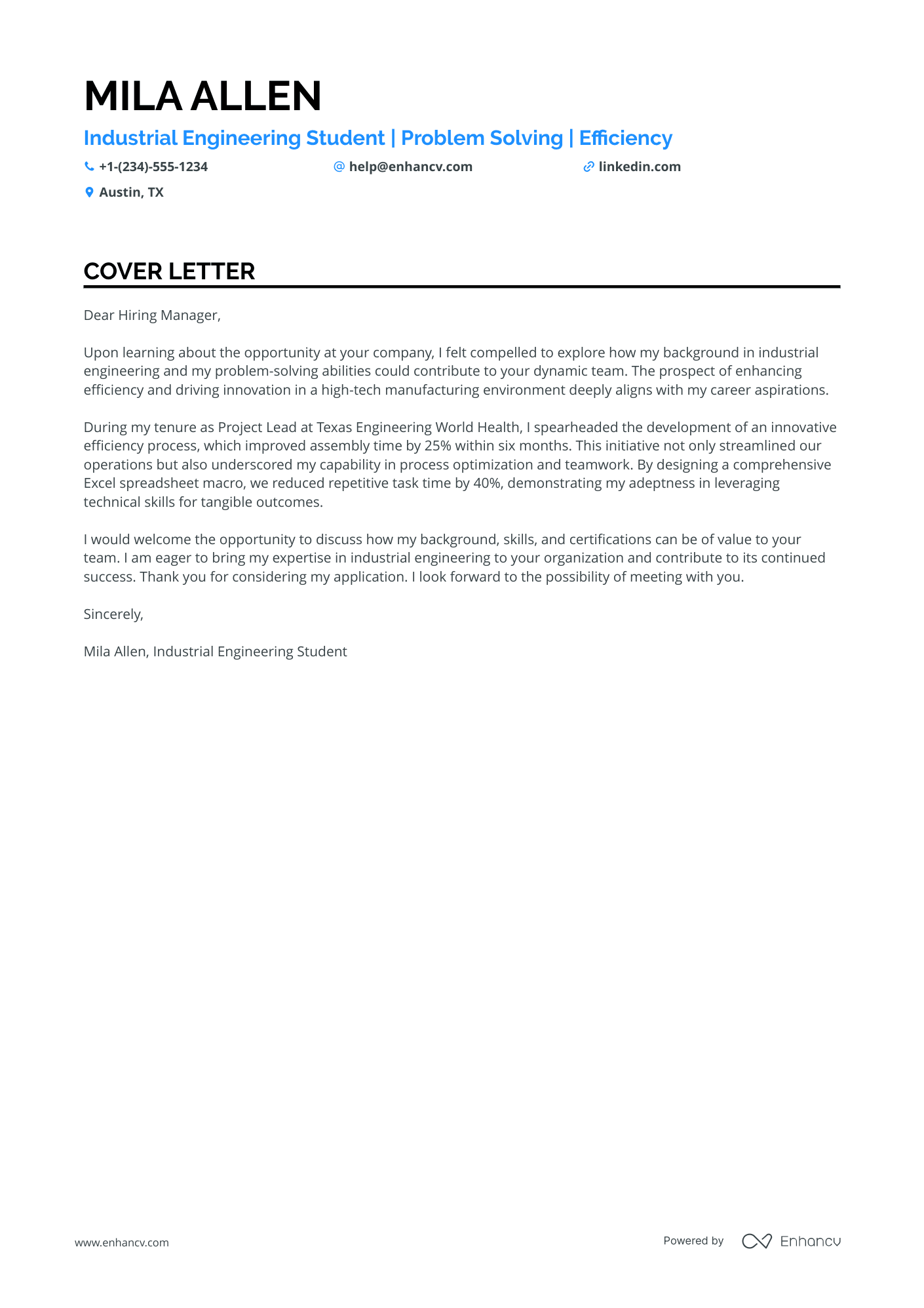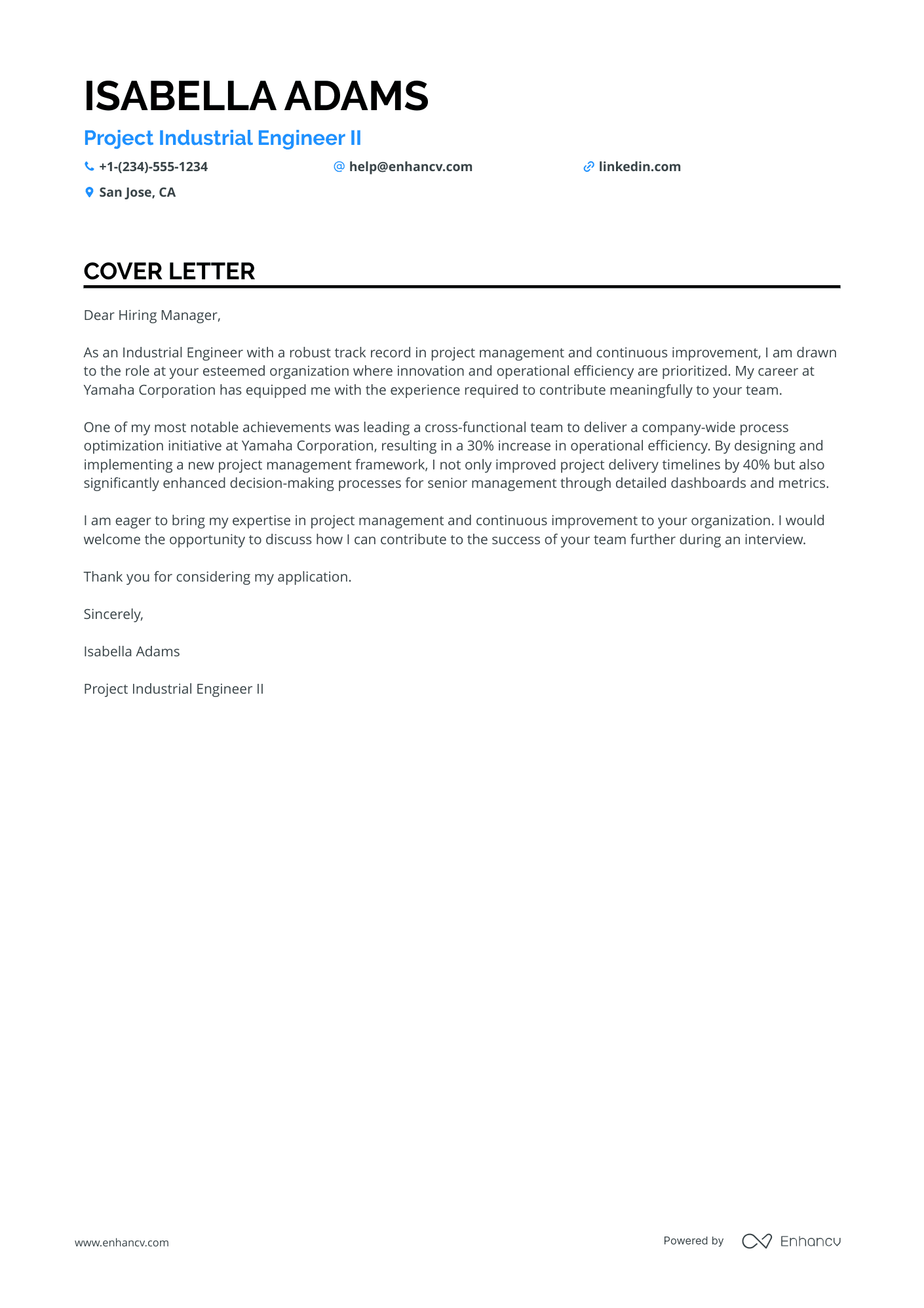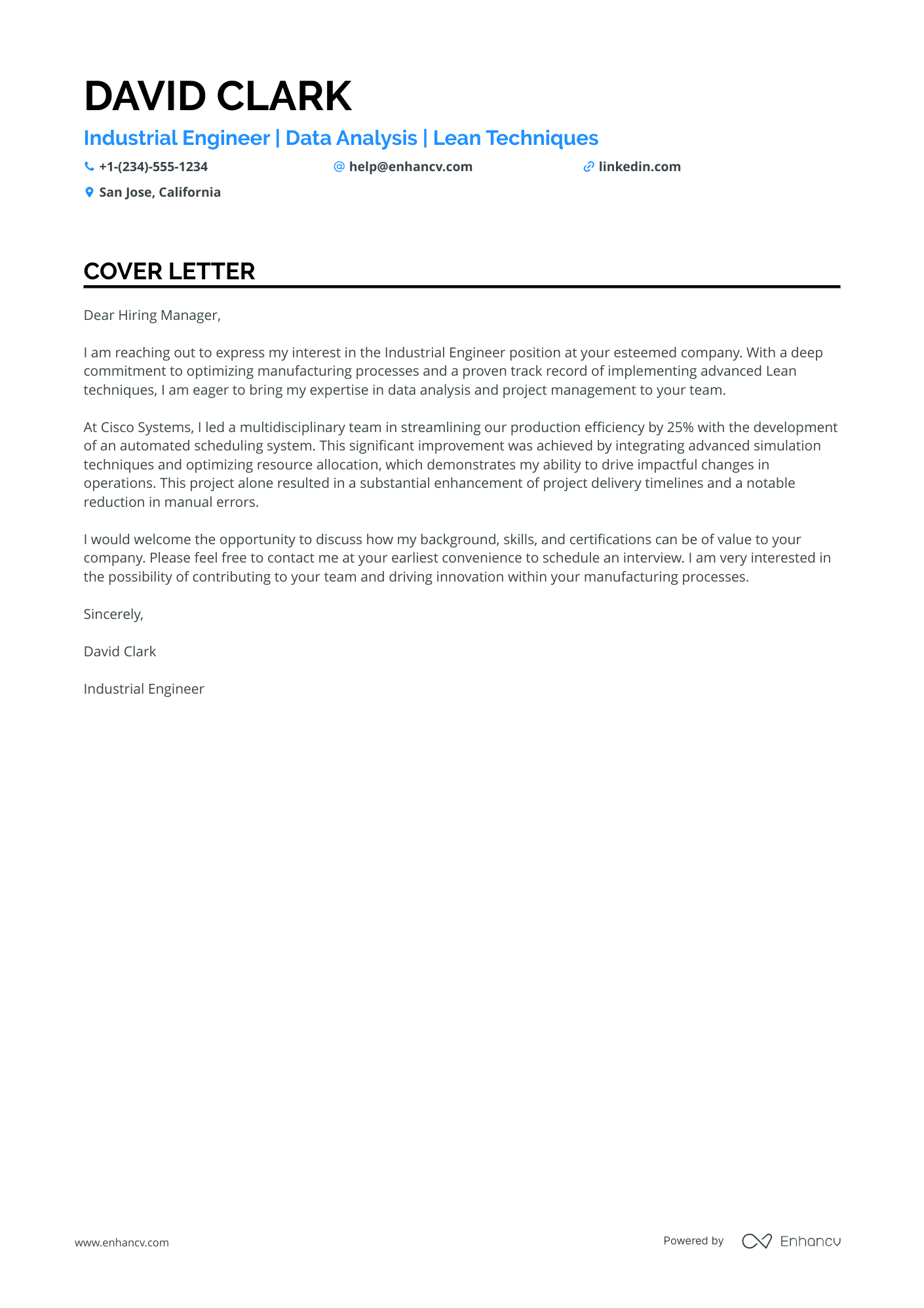Crafting an industrial engineer cover letter can be daunting, especially after discovering it’s a necessity alongside your resume. The challenge lies in showcasing your proudest professional moment without echoing your CV. Your story matters, and telling it with sincerity while steering clear of clichés will set you apart. Remember, formality is key, but so is brevity; convey your narrative succinctly within a single page to make the right impact. Let's begin unraveling the art of a compelling cover letter.
- Create a industrial engineer cover letter to persuade the recruiters you're the best candidate for the role;
- Use industry-leading industrial engineer cover letter templates and examples to save time;
- Dedicate your industrial engineer cover letter space to your best achievement;
- Make sure your industrial engineer cover letter meets recruiters' expectations and standards.
Avoid starting at the blank page for hours by using Enhancv's AI - just upload your resume and your industrial engineer cover letter will be ready for you to (tweak and) submit for your dream job.
If the industrial engineer isn't exactly the one you're looking for we have a plethora of cover letter examples for jobs like this one:
- Industrial Engineer resume guide and example
- Petroleum Engineer cover letter example
- VP of Engineering cover letter example
- Landscape Architect cover letter example
- Construction Superintendent cover letter example
- Manufacturing Engineer cover letter example
- Audio Engineer cover letter example
- Biomedical Engineer cover letter example
- Systems Engineer cover letter example
- Engineering Project Manager cover letter example
- Engineering Intern cover letter example
Drop your resume here or choose a file.
PDF & DOCX only. Max 2MB file size.
Industrial engineer cover letter example
BRENDA CALVIN
San Francisco, CA
+1-(234)-555-1234
help@enhancv.com
- Emphasizing hands-on experience with process optimization can resonate with hiring managers looking for candidates who possess practical skills that align with an industrial manufacturing context.
- Including quantifiable achievements, such as increased production throughput and cost savings, offers a concrete demonstration of the candidate's impact on previous organizations and suggests potential benefits to the prospective employer.
- Referencing familiarity with industry methodologies like Six Sigma signals to the employer that the candidate is not only trained in quality control but also versed in systematic approaches to process improvement.
Designing your industrial engineer cover letter: what is the best format
Let's start with the basics, your industrial engineer cover letter should include your:
- Header
- Greeting
- Introduction
- Body paragraph
- Closing statement
- Signature (that's not a must)
Next, we'll move to the spacing of your industrial engineer cover letter, and yes, it should be single-spaced (automatically formatted for you in our cover letter templates).
Don't go for a old-school font (e.g. Arial or Times New Roman), but instead, pick an ATS-favorite like Chivo, Volkhov, or Raleway, to stand out.
Our cover letter builder is also set up for you with the standard one-inch margin, all around the text.
Finally, ensure your industrial engineer resume and cover letter are in the same font and are submitted in PDF (to keep the formatting in place).
P.S. The Applicant Tracker System (or ATS) won't be assessing your [job] cover letter, it's solely for the recruiters' eyes.
Need a cover letter, but short on time? Use our free cover letter generator to create one from your resume in no time.
The top sections on a industrial engineer cover letter
- Header: The header includes your contact information, the date, and the employer's details, and it is critical for making a professional first impression and ensuring the employer can easily identify and contact you.
- Greeting: Tailoring the greeting by using the recruiter's name demonstrates attention to detail and personalization, which are valued traits in an industrial engineer responsible for optimizing complex processes.
- Introduction: In the introductory paragraph, quickly summarize your industrial engineering qualifications and express your enthusiasm for the position, which sets the stage for the detailed examples you will provide later.
- Body (Problem-Solution-Result format): The body should highlight relevant projects and experiences using a problem-solution-result approach, reflecting the systematic, analytical nature of an industrial engineer's problem-solving skills.
- Closing: The closing section should reiterate your suitability for the role, your interest in contributing to the company's success, and a call to action, such as expressing your eagerness to discuss how you can apply your process improvement strategies to their operations.
Key qualities recruiters search for in a candidate’s cover letter
- Proven experience in process improvement: Demonstrates the ability to enhance efficiency, reduce waste, and optimize productivity, core responsibilities for an industrial engineer.
- Proficiency in industrial software tools: Indicates competence with CAD, ERP, and simulation software pertinent to designing and analyzing production systems.
- Strong analytical and problem-solving skills: Essential for identifying issues within operations and developing effective, innovative solutions.
- Experience with Lean Manufacturing and Six Sigma methodologies: Shows knowledge and application of industry-standard practices for quality control and continuous improvement.
- Project management experience: Highlights the capacity to oversee projects from conception through implementation, an important aspect of an industrial engineer's role.
- Excellent communication and teamwork abilities: Reflects the need to effectively collaborate with cross-functional teams and communicate technical concepts clearly to stakeholders.
Personalizing your industrial engineer cover letter salutation
Always aim to address the recruiter from the get-go of your industrial engineer cover letter.
Use:
- the friendly tone (e.g. "Dear Paul" or "Dear Caroline") - if you've previously chatted up with them on social media and are on a first-name basis;
- the formal tone (e.g. "Dear Ms. Gibbs" or "Dear Ms. Swift") - if you haven't had any previous conversation with them and have discovered the name of the recruiter on LinkedIn or the company website;
- the polite tone (e.g. "Dear Hiring Manager" or "Dear HR Team") - at all costs aim to avoid the "To whom it may concern" or "Dear Sir/Madam", as both greetings are very old-school and vague.
List of salutations you can use
- Dear Hiring Manager,
- Dear [Company Name] Team,
- Dear [Department] Manager,
- Dear Mr./Ms. [Last Name],
- Dear [First Name] [Last Name],
- Dear Dr. [Last Name],
The industrial engineer cover letter intro: aligning your interest with the company culture
You only have one chance at making a memorable first impression on recruiters with your industrial engineer cover letter.
Structure your introduction to be precise and to include no more than two sentences.
Here are some ideas on how to write a job-winning industrial engineer cover letter introduction:
- get creative - show off your personality from the get-go (if this aligns with the company culture);
- focus on your motivation - be specific when you say what gets you excited about this opportunity.
Structuring your industrial engineer cover letter body to add more value
You've hinted at your value as a professional (this may be your passion for the job or interest in the company) in your introduction.
Next, it's time to pan out the body or middle of your industrial engineer cover letter.
When creating your resume, you've probably gone over the advert a million times to select the most relevant skills.
Well, it's time to repeat this activity. Or just copy and paste your previous list of job-crucial requirements.
Then, select one of your past accomplishments, which is relevant and would impress hiring managers.
Write between three and six paragraphs to focus on the value your professional achievement would bring to your potential, new organization.
Tell a story around your success that ultimately shows off your real value as a professional.
Thinking about the closing paragraph of your industrial engineer cover letter
Before your signature, you have extra space to close off your industrial engineer cover letter.
Use it to either make a promise or look to the future.
Remind recruiters how invaluable of a candidate you are by showing what you plan to achieve in the role.
Also, note your availability for a potential next meeting (in person or over the telephone).
By showing recruiters that you're thinking about the future, you'd come off as both interested in the opportunity and responsible.
Which story should you tell in your industrial engineer cover letter when you have zero experience
Candidates, lacking professional experience in the field - this one is for you.
Your industrial engineer cover letter is an exercise of integrity, honesty, and, above all, spinning a positive narrative around your strengths.
And what better way to capture recruiters' attention than with your most job-relevant achievement (this could be from your internship or volunteering experience)?
Make sure to back up your success with transferrable skills that are relevant to the job (e.g. how your year, studying abroad, has taught you to be more motivated and handle multicultural environments).
Another safe card you can bet on is your career dream: in the body of your industrial engineer cover letter, go into the details of how your ambitions would help make the company you're applying for better.
Key takeaways
Creating your industrial engineer cover letter should be a personalized experience for the role and the recruiter, where you:
- Format your cover letter using the same ATS-friendly font (e.g. Railway) as you did for your resume;
- Greet recruiters, using their name, and follow up with two sentences to introduce yourself, your interest in the role, and to stand out;
- Map out one key success from your career (or life) that has taught you job-crucial skills;
- Substitute your lack of experience with an achievement from your internships, degrees, or volunteering gigs;
- End with a promise for your potential or your availability for an interview.
Industrial Engineer cover letter examples
By Experience
Junior Industrial Engineer
- Highlighting quantifiable achievements, such as improving workflow by a specific percentage, effectively demonstrates the candidate's impact and success in previous roles.
- Aligning personal experiences and successes with the company's values or goals to showcase an understanding of and commitment to their mission.
- Emphasizing relevant industry-specific skills, like process optimization, that directly relate to the job description encourages alignment with the role's requirements.
- Expressing enthusiasm for the company and the opportunity while also encouraging further discussion or an interview strengthens the candidate's interest and initiative.
Industrial Engineering Intern
- Highlighting Relevant Experience: The letter effectively showcases a specific achievement in process optimization, which is directly relevant to the industrial engineering role, emphasizing the candidate’s practical impact on efficiency.
- Quantifying Accomplishments: By providing specific numbers, such as improving assembly time by 25% and reducing task time by 40%, the candidate quantifies their achievements, thereby adding credibility and weight to their claims.
- Technical Skillset: The mention of designing a comprehensive Excel macro demonstrates the candidate’s technical prowess and ability to apply software skills to improve processes in a professional setting.
- Alignment with Company Goals: The candidate expresses how their career aspirations align with the company’s focus on innovation and efficiency, indicating a fit both in terms of skills and professional interests.
Entry-Level Industrial Engineer
- Highlighting Specific Achievements: The letter effectively showcases a tangible result (30% increase in operational efficiency) from leading a process optimization initiative, demonstrating the candidate's capability to deliver impactful outcomes.
- Use of Metrics and Data: The use of precise metrics such as the 40% improvement in project delivery timelines strengthens the candidate's claims and presents a convincing case of their effectiveness in the role.
- Relevant Experience: By mentioning their tenure at Yamaha Corporation, the candidate contextualizes their expertise in a reputable company known for operational excellence, which aligns with the prospective employer's priorities.
- Direct Connection to Job Role: The candidate articulates how their industrial engineering experience in project management and continuous improvement makes them well-suited for the role, showing a thorough understanding of the job requirements.
By Role
Associate Industrial Engineer
- Emphasize measurable achievements, such as increasing production efficiency by 25%, to demonstrate the impact of your contributions and effectiveness in a similar role.
- Highlight key skills and techniques specific to the field, like Lean techniques, simulation, and resource optimization, to show proficiency and understanding of essential industry practices.
- Showcase leadership abilities by mentioning experience leading a multidisciplinary team and successfully implementing process improvements, which is vital for a role that often involves coordinating with various departments.













